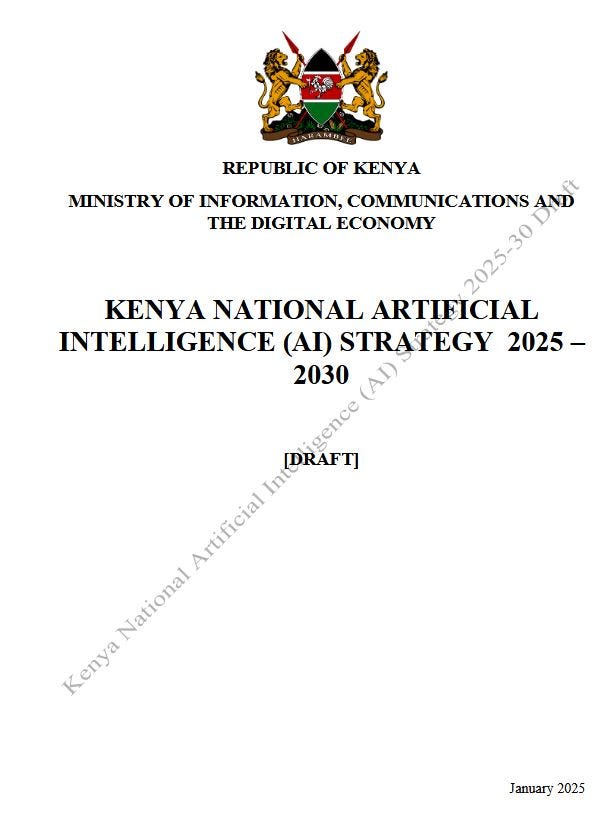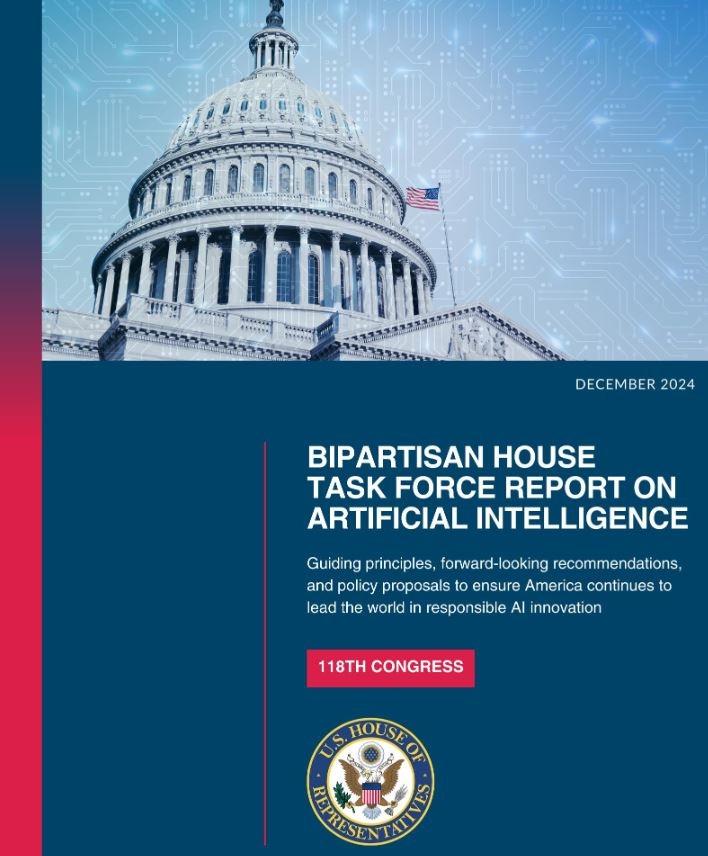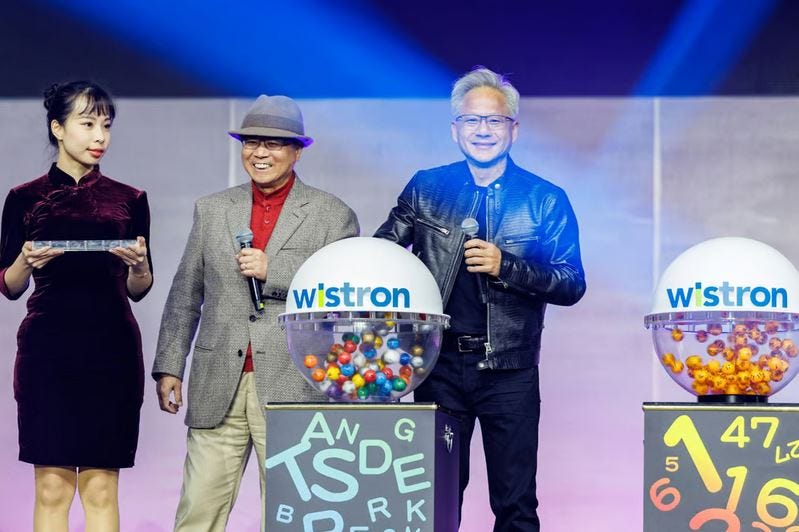🤖 AI Policy this week #041. Trump revokes US AI Exec Order on risks; Kenya opens consultation on strategy 2025–2030.
A quick summary of news, reports and events discussing the present and future of AI and the governance framework around its development.
US President Donald Trump new administration marked past week (and probably many more coming ahead). In this regard, the summary places the latest developments on top, but covers measures by now former US President Biden, some of them still in place.
I could not share it on Monday, following Martin Luther King Jr. Day US federal holiday, but mostly overwhelmed by everything happening yesterday. Hopefully, I will return to Mondays next week 🤞.
1. News
Trump Revokes Biden's AI Executive Order on addressing risks; fills science positions.
On his first day in office, US President Donald Trump rescinded Joe Biden's 2023 AI executive order which mandated safety testing for AI systems before public deployment. The move reflects Trump's commitment to reducing regulatory burdens on AI development, as outlined in the Republican Party platform. Trump had selected Silicon Valley executive Michael Kratsios as director of the Office of Science and Technology Policy (OSTP). Meanwhile, computer scientist Lynne Parker from the University of Tennessee, Knoxville, has been appointed to a new position – executive director of the President’s Council on Advisors on Science and Technology.
Biden had issued an executive order for building AI data centers on federal land.
The order calls for leasing federal sites owned by Defense and Energy departments to host gigawatt-scale AI data centers and new clean power facilities - to address enormous power needs in a short time frame. The order also requires companies tapping federal land for AI data centers to purchase an "appropriate share" of American-made semiconductors. The number of purchases required would be worked out on a case-by-case basis for each project. This directive was not repealed by Trump so it remains in effect
US HHS lays out a strategic plan for healthcare AI.
The HHS has released a strategic plan that lays out the agency’s road map for overseeing artificial intelligence in the healthcare sector. The plan — which covers AI in medical research, products like drugs and devices, healthcare delivery, social services and public health — comes as AI has become an enticing emerging technology for healthcare executives looking to stretch the industry’s often-beleaguered workforce. The framework’s main objective is to establish a safe, coordinated public-private approach to improve quality and accessibility of healthcare services, the HHS said.
The EU and China join industry backlash against Biden’s AI Chip export restrictions.
Seventeen EU nations face export restrictions ; the bloc hopes to persuade the incoming Trump administration to change the rules. “We believe it is also in the US economic and security interest that the EU buys advanced AI chips from the US without limitations,” read a joint statement by EU executive vice-president for tech sovereignty, security, and democracy, Henna Virkkunen, and trade and economic security commissioner, Maroš Šefčovič. “We have already shared our concerns with the current US administration, and we are looking forward to engaging constructively with the next US administration,” they said. Meanwhile, Guo Jiakun, a spokesperson for China’s Foreign Ministry, stressed that the US has been overstretching the concept of national security, politicizing and weaponizing trade and tech issues, and abusing export controls to maliciously suppress China. "China firmly opposes the US decision and will take firm measures to safeguard the legitimate and lawful rights and interests of Chinese companies."
Kenya AI strategy 2025–2030 draft open for public input.
The Ministry of Information, Communication, and the Digital Economy (MoIC&DE), through the AI Steering Committee, is developing Kenya’s AI National Strategy. As required by the Kenyan Constitution, which emphasizes public participation in policymaking, the ministry is inviting the public, stakeholders, and interested parties to review the draft strategy and submit their feedback, comments, and recommendations to guide its refinement.
Switzerland delays initial guidelines for regulating AI.
The Federal Office of CommunicationsExternal link (OFCOM) has been charged with producing the initial guidelines for regulating AI in Switzerland. The recommendations were due to be delivered by the end of 2024 but have been delayed by a month. Fifteen experts, including two specially hired lawyers, have produced three baseline reports on the “complex topic”, comprising several hundred pages. They are expected to be made public by the government later this month. The delay resulted from other government departments needing more time to review the reports and suggest changes, OFCOM said.
The Indonesian government vows to complete AI regulation in three months.
Communications and Digital Minister Meutya Hafid has vowed to finish drafting a regulation on artificial intelligence (AI) in the next three months, under an effort led by second deputy communications minister Nezar Patria. She added the government had issued a circular on AI use until the draft regulation was in place, emphasizing that Indonesia was among the first Southeast Asian countries to develop such legislation.
Maharashtra (India) govt forms 16-member panel to draft first AI policy.
Minister for Information Technology, Ashish Shelar, declared that the committee, chaired by the director of the Directorate of Information Technology, Mumbai, will draft the state’s first-ever AI policy. Shelar emphasised that Maharashtra would become the first state to have a dedicated AI policy. “Maharashtra’s AI Policy will build upon the framework of India AI Mission Policy and will suggest to complement the Central government’s AI Mission work by combining it with Maharashtra’s nation-leading entrepreneurial energy and dynamism,” Shelar said.
2. Reports, Briefs and Opinion Pieces:
“Expanded ASEAN Guide on AI Governance and Ethics – Generative AI”, by the Association of Southeast Asian Nations (ASEAN).
“This Guide supplements the ASEAN Guide on AI Governance and Ethics (2024), which focuses on traditional AI technologies, with policy considerations related to generative AI (Gen AI). It provides a view of the opportunities and risks of Gen AI and recommends a range of policy recommendations for ASEAN to support its responsible adoption”.
“Bipartisan House Task Force Report on Artificial Intelligence”, by US House of Representatives.
Published in December and developed in consultation with committees of jurisdiction, the report includes guiding principles and forward-looking recommendations to advance America’s leadership in AI innovation responsibly. “Because advancements in AI have the potential to rapidly transform our economy and national security, Leader Jeffries and I established the Bipartisan Task Force on AI to ensure America continues leading in this strategic arena. Developing a bipartisan vision for AI adoption, innovation, and governance is no easy task, but a necessary one as we look to the future of AI and ensure Americans see real benefits from this technology,” said Speaker Mike Johnson.
“New Year, New AI Policy?”, opinion piece by Jennifer Huddleston from CATO Institute.
“The light-touch approach to technology has allowed innovation and entrepreneurship to flourish in the US, and its uses support the spread of democratic values. As the new administration and Congress consider AI policy, they should look for opportunities to support the beneficial innovation it brings and respond to harm. In the face of European and state-level regulation, however, a proactive statement of intended policy will likely be needed to overcome the problems that could arise and prevent American companies from strongly competing on a global stage”, the author argues.
3. Events:
Wistron year-end party (Jan 17, Taipei, Taiwan).
Nvidia CEO Jensen Huang attended and emphasized the early stage of AI development and the crucial role of partners like Wistron in the supply chain.
In Taipei, Huang also hosted a high-profile lunch, attended by 36 top executives from Taiwan’s leading technology companies. This gathering included Foxconn Technology Group chairman Liu Young-way, Foxconn industrial internet chairman Brand Cheng, Acer chairman Jason Chen, Quanta Computer chairman Barry Lam and vice-chairman C.C. Leung, Wistron chairman Simon Lin, Asus chairman Jonney Shih, ASRock president Hsu Lung-luen, Pegatron chairman TH Tung, MSI chairman Joseph Hsu, Inventec chairman Sam Yeh and president Jack Tsai, and more.
Thanks for reading, please share any comments and see you next week.








